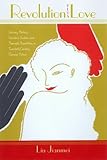Revolution Plus Love : Literary History, Women's Bodies, and Thematic Repetition in Twentieth-Century Chinese Fiction / Liu Jianmei.
Material type: TextPublisher: Honolulu : University of Hawaii Press, [2003]Copyright date: ©2003Description: 1 online resource (288 p.)Content type:
TextPublisher: Honolulu : University of Hawaii Press, [2003]Copyright date: ©2003Description: 1 online resource (288 p.)Content type: - 9780824825867
- 9780824843304
- 890
- online - DeGruyter
- Issued also in print.
| Item type | Current library | Call number | URL | Status | Notes | Barcode | |
|---|---|---|---|---|---|---|---|
 eBook
eBook
|
Biblioteca "Angelicum" Pont. Univ. S.Tommaso d'Aquino Nuvola online | online - DeGruyter (Browse shelf(Opens below)) | Online access | Not for loan (Accesso limitato) | Accesso per gli utenti autorizzati / Access for authorized users | (dgr)9780824843304 |
Frontmatter -- Contents -- Acknowledgments -- Introduction -- 1. The Unusual Literary Scene -- 2. In the Eyes of the Leftists -- 3. Feminizing Politics -- 4. Shanghai Variations -- 5. Love Cannot Be Forgotten -- 6. Farewell or Remember Revolution? -- Conclusion -- Notes -- Glossary -- Bibliography -- Index
restricted access online access with authorization star
http://purl.org/coar/access_right/c_16ec
In the aftermath of the May Fourth movement, a growing expectation of revolution raised important intellectual issues about the position of the individual within a society in turmoil and the shifting boundaries of political and sexual identities. The theme of "revolution plus love," a literary response to the widespread insurrections and upheaval, was first popularized in the late 1920s. In her examination of this popular but understudied literary formula, Liu Jianmei argues that revolution and love are culturally variable entities, their interplay a complex and constantly changing literary practice that is socially and historically determined.Liu looks at the formulary writing of "revolution plus love" from the 1930s to the 1970s as a case study of literary politics. Favored by leftist writers during the early period of revolutionary literature, it continued to influence mainstream Chinese literature up to the 1970s. By drawing a historical picture of the articulation and rearticulation of this theme, Liu shows how changes in revolutionary discourse force unpredictable representations of gender rules and power relations, and how women's bodies reveal the complex interactions between political representation and gender roles. Revolution Plus Love is a nuanced and carefully considered work on gender and modernity in China, unmatched in its broad use of literary resources. It will be of considerable interest to scholars and students of modern Chinese literature, women's studies, cultural studies, and comparative literature.
Issued also in print.
Mode of access: Internet via World Wide Web.
In English.
Description based on online resource; title from PDF title page (publisher's Web site, viewed 02. Mrz 2022)


